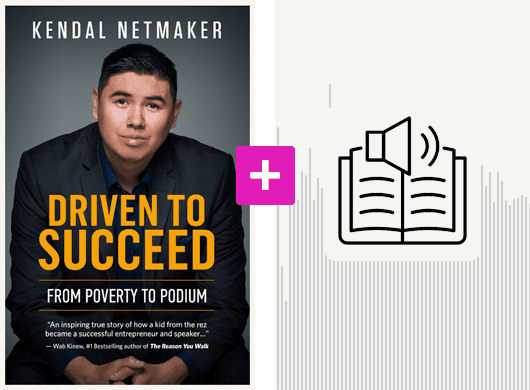I want you to know the power of your story.
Your story is your power.
Everyone has a story.
All of the challenges, the wins, the losses have shaped you and your journey and people need to hear that.
People may get inspired from your journey.
I oftentimes get asked to go into organizations, to work with companies, with leaders and so on to help bring more awareness, unity to teams and so on, and one of the things I often get them to do is to start doing more storytelling exercises.
Now, the reason I really encourage people to take the time to actually engage in meaningful conversations is because when you know people and their challenges, their struggles to be in the room, sitting with you across that table and talking and conversing with them, you start knowing about maybe they have a family, maybe they are by themselves, maybe they had to come from a different country, maybe they could come from a reserve and so on.
When you take the time to understand them, their challenges, what got them there, and you flip that table around and they give you the floor to do the same thing.
What tends to happen is people start to develop more meaningful connections.
When you develop more meaningful connections, you develop more friendships in the workplace outside the workplace, especially in a company when you’re dealing with change, with conflict, with opportunities.
If you don’t know each other on that human to human basis, that personal level, you’re going to struggle when opportunities come and when conflicts arise, it’s inevitable. Everyone goes through them, but when you understand each other, when you’re taking the time to understand each other’s story, where people come from their challenges to get to that moment, you’ll be in a better position to handle them more effectively.
You’ll waste less time.
This is important to engage in meaningful conversations.
I remember being a summer student many years back and I remember the coffee breaks were very unmeaningful many a times. It was discussing politics and all the stuff that we had no control over, and it became very negative, very toxic. And that would overflow into the productivity of the rest of the work day,
and I remember going through that like, I used to dread the coffee breaks because it was going to be another complain fest.
What if we were to structure those into more meaningful conversations where people actually had a time to make their voice heard? This could be very powerful.
Now, people often say, “Well, I don’t think my story is interesting.”
Everyone has an interesting story.
I always tell people that the story that you tell, I always say try to find a turning point event in your life, something that… It’s almost like you’re reading those childhood books where you can pick your ending option A or option B. We all go through that. We have something that came into our life.
It could have been a positive, a negative scenario where it could have been like this road or this road, but you chose this road and this is what happened. Tell those stories. I oftentimes tell the story of Johan and his family, how they helped me. They paid for my soccer fee, drove me to games and practices, it really empowered me.
I talk about the coaches in my life that have really had a positive impact on me. I talk about when I first got up to speak and I stumbled and fell down those stairs. Those are stories that we all have, those type of similar stories where we’ve struggled through things. Some of us have gone through hardships.
Your story is your power.
It’s easy to forget the profound impact that our stories can have. Your journey, with all its twists and turns, challenges, victories, and defeats, is a powerful tool waiting to be unleashed. Your story is your power, and in this blog post, we’ll explore why sharing it can lead to more meaningful connections in the workplace.
The Call for Meaningful Conversations
In the realm of organizational development and team building, there’s a growing emphasis on the importance of storytelling exercises. Whether it’s within a company, among leaders, or within teams, the goal is to foster awareness and unity. By delving into meaningful conversations, individuals can open up about their challenges, struggles, and personal journeys.
Understanding your colleagues on a human-to-human basis, beyond their professional roles, is crucial. It involves acknowledging the diversity of experiences—family backgrounds, immigration stories, and unique struggles that have shaped them. As you take the time to comprehend these narratives, a reciprocal sharing dynamic develops.
Developing Genuine Connections
The magic happens when the table turns, and individuals are given the opportunity to share their own stories. This reciprocity builds bridges and forges connections that extend beyond the workplace. Meaningful connections, whether in the office or outside of it, become the foundation for navigating change, resolving conflicts, and capitalizing on opportunities.
When individuals know each other on a personal level, they are better equipped to handle the inevitable challenges that arise. The familiarity with each other’s stories enables a more effective and efficient response to conflicts and opportunities, ultimately saving time and fostering a more cohesive work environment.
The Pitfalls of Unmeaningful Conversations
Reflecting on personal experiences as a summer student, the author highlights the negative consequences of unmeaningful conversations during coffee breaks. Engaging in discussions about politics and other uncontrollable external factors led to toxicity that spilled into the workday, affecting productivity and morale.
This serves as a powerful reminder of the importance of structuring breaks and conversations in a way that allows individuals to make their voices heard. Shifting from complaint-focused discussions to meaningful conversations can transform the workplace atmosphere and contribute positively to team dynamics.
The Universality of Interesting Stories
A common misconception is that not everyone has an interesting story to tell. The author refutes this notion, emphasizing that every individual possesses a compelling narrative. The key is to identify turning points—those moments reminiscent of childhood books with branching paths—and share the choices made and their consequences.
By encouraging individuals to delve into their personal experiences, whether positive or negative, a treasure trove of powerful stories emerges. These stories serve as a testament to resilience, growth, and the human experience.
Unveiling the Power of Personal Anecdotes
To illustrate the transformative power of storytelling, the author shares personal stories. From the generosity of Johan’s family during the author’s soccer days to the impactful coaches who played a pivotal role, these anecdotes resonate on a human level. Even moments of vulnerability, like stumbling while speaking in public, become valuable narratives that connect us all through shared experiences of struggle and triumph.
Embracing Your Power
In conclusion, your story is not just a collection of events; it’s a reservoir of power waiting to be harnessed. By engaging in meaningful conversations, sharing experiences, and embracing the richness of individual narratives, we pave the way for stronger connections, increased empathy, and a more harmonious workplace.
So, the next time you question whether your story is interesting, remember: your story is unique, valuable, and has the potential to inspire and connect with others. Embrace your power, share your narrative, and contribute to a workplace culture built on the strength of meaningful connections.



